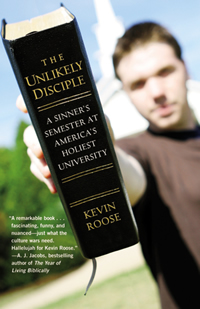Book Notes
 Kevin Roose, The Unlikely Disciple; A Sinner's Semester at America's Holiest University (New York: Grand Central Publishing, 2009), 324pp.
Kevin Roose, The Unlikely Disciple; A Sinner's Semester at America's Holiest University (New York: Grand Central Publishing, 2009), 324pp.
Kevin Roose was a sophomore at Brown University when he decided to spend a "domestic study abroad" at Jerry Falwell's Liberty University in Lynchburg, Virginia. Raised in a politically liberal and religiously Quaker home, he knew that "a tree-hugging Brown student isn't supposed to be able to talk to a Bible-thumping Liberty student." But very much to his credit, he asked, "but why not?" It didn't sit well with him that he was part of the 51% of Americans who didn't know an evangelical Christian. So despite the shock and fears of family and friends, he spent the spring semester of 2007 at Liberty, taking a full load of six classes, living in the dorm with two roommates, singing in the choir of Thomas Road Baptist Church, attending prayer groups, dating, and participating in Friday night Bible studies. This book tells that story.
There are no cheap shots in this book. Roose hid his plans about writing his book, but otherwise participated fully in his new life with an open mind. He gives much credit whenever he thinks it is due. The girls were gorgeous, and he actually loved the strict dating rules, because when sex was taken off the table he felt more authentic than manipulative. He describes Liberty students as friendly, well-adjusted, articulate, and nothing like the stereotype of "angry zealots." There are renegade non-conformists at Liberty, and he introduces us to them and their antics (like naked skateboarding in the dorm). He was pleasantly surprised to learn that many students at Liberty have doubts and freely express them.
Nor does Roose pull any punches. He was mystified at his History of Life course in which a genuinely qualified scientist taught young-earth creationism. He concluded that Liberty's academic process is conflicted and compartmentalized (and the students complain about this). He participated in but disliked cold turkey evangelism in Daytona Beach over spring break. He introduces us to the student handbook with its legalistic code of "reprimands" and financial fines. The overt homophobia bothered him deeply.
Roose thought that his biggest challenge at Liberty would be all the people who rubbed him the wrong way, so he was surprised to find himself genuinely caring about new friends and having an honestly good time. He loved the feeling of being prayed for. Although he didn't convert in the Liberty sense of that word, he felt the spiritual, emotional and intellectual grounds shift beneath him. He concluded that there's a big difference between the students at Liberty and the university's "core ideology." With few exceptions, human decency triumphed over hard-line dogmatism. "One of the most humanizing things I learned this semester is that even at Liberty, personality trumps ideology." Instead of seeing a unified whole, he came to appreciate a range of complex nuances. The best part about this book is how it challenges the mutual paranoia of social groups that trade in stereotypes based upon lack of exposure to each other's stories.


